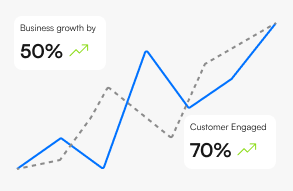Revolutionizing Enterprise Service Desks: The Power of AI Chatbots in Automation

Rajesh Bhattacharjee
December 05, 2023
7 min

Table of Contents
In the rapidly evolving world of business technology, enterprise service desks have emerged as critical hubs for addressing IT issues and supporting user needs. However, with the growing complexity of IT environments and user demands, traditional service desk models are increasingly under strain. This is where AI chatbot maker come in, offering an innovative solution to revolutionize service desk operations.
AI chatbots, powered by artificial intelligence and machine learning, transform how enterprises manage their service desks. These intelligent systems can automate repetitive tasks, provide instant responses to user queries, and learn from interactions to enhance their performance over time. The integration of AI chatbots into service desks not only optimizes operational efficiency but also significantly improves the user experience.
This blog explores the transformative role of AI chatbots in enterprise service desk automation. We will delve into the current state of IT service desks, the cost implications, and the myriad challenges they face. Subsequently, we will discuss how AI chatbots address these challenges, reshape service desk dynamics, and set new standards for efficiency and customer satisfaction.
The Growing Market of IT Service Desks
The IT service desk market is experiencing a period of remarkable growth. In 2022, the market was valued at a notable USD 2291.41 million and is anticipated to rise to USD 5938.37 million by 2028.This increase reflects a 17.2% compound annual growth rate (CAGR) from 2022 through 2028. (LinkedIn). Another report by Cognitive Market Research pegged the market size at USD 197.5 billion in 2022, with expectations of continued expansion at a CAGR of 17.60% from 2023 to 2030 (Cognitive Market Research).
This substantial expansion is due to the growing dependence on IT infrastructure across diverse business domains and the rising demand for effective, technology-oriented support systems. As businesses continue integrating advanced technologies, the demand for robust IT service desks capable of handling complex queries and offering seamless support is more pronounced than ever.
Cost Analysis of Enterprise Service Desks
Understanding the cost dynamics of enterprise service desks is crucial for businesses aiming to optimize their IT support functions. The average per-ticket cost is a critical metric in this regard. According to BMC Software, an efficient service desk team should aim to resolve tickets for $20 or less, ensuring satisfactory service delivery (BMC Software). GHDSi reports an average monthly cost per ticket of $25, with the North American IT help desk average hovering around $22 (GHDSi).
These costs encompass various factors, including labor, technology investments, training, and infrastructure. High per-ticket costs can drain resources, especially when multiplied across hundreds or thousands of tickets handled monthly. In contrast, a lower cost per ticket indicates efficient resource utilization and streamlined operations, contributing to the overall financial health of the enterprise.
In the following sections, we will explore how AI chatbots are instrumental in addressing the challenges of cost management, enhancing the quality of service delivery, and optimizing human resource management in enterprise service desks.
Challenges Faced by Enterprise Service Desks
Enterprise service desks are continually grappling with challenges impacting their efficiency and effectiveness. Key among these are:
- Cost Management: With the constant need to update and maintain cutting-edge IT solutions, operational costs are constantly rising. Additionally, unpredictable ticket volumes make budgeting and resource allocation a complex task.
- Quality of Service Delivery: As technology evolves, keeping pace with these changes and integrating them into existing service desk processes is a significant challenge. Moreover, there is increasing pressure to meet heightened user expectations for rapid and accurate issue resolution.
- Human Resource Management: High turnover rates in IT support staff can lead to losing institutional knowledge, and ongoing training requirements add to operational costs. Balancing workloads to avoid staff burnout while ensuring efficiency is another critical concern.
These challenges underscore the need for a more agile, responsive, cost-effective service desk management approach.
Role of AI Chatbots in Addressing Service Desk Challenges
AI chatbots are proving to be a game-changer in addressing these challenges. Here’s how:
- Streamlining Cost Management: AI chatbots reduce the per-ticket cost by automating routine inquiries and tasks, freeing human agents for more complex issues. This not only cuts down operational costs but also optimizes resource allocation.
- Improving Service Quality: With AI chatbots, enterprises can provide instant, 24/7 support. These bots are programmed to learn from interactions, continuously improving their ability to handle queries more accurately and efficiently.
- Managing Human Resources Effectively: AI chatbots take on repetitive and mundane tasks, allowing human agents to focus on more challenging and rewarding work. This may result in increased job contentment and lower staff turnover rates.
Integrating AI chatbots is thus not just a technological upgrade but a strategic move towards a more sustainable and effective service desk model.
Benefits of AI Chatbots in Enterprise Service Desks
The introduction of AI chatbots into enterprise service desks brings a host of benefits:
- Enhanced Efficiency and Accuracy: AI chatbots process queries faster than human agents, providing quick and consistent responses. Their ability to learn and adapt results in improved accuracy over time.
- Round-the-Clock Support: Unlike human agents, AI chatbots can operate 24/7, ensuring that support is available anytime, enhancing user satisfaction.
- Personalized User Experiences: Through machine learning, AI chatbots can offer personalized interactions by understanding and remembering user preferences and history.
Case Studies: AI Chatbots in Action
To illustrate the impact of AI chatbots in real-world scenarios, let’s look at some case studies:
- Franciscan Health: A leading American healthcare provider implemented an AI chatbot to address patient care challenges during the COVID-19 pandemic.
- Riverty, Arvato Finance: This financial institution routed 23% of all conversations through the AI chatbot 'Sofie,' which achieved a response accuracy of over 90%.
- Generali, France: The company saw a reduction in the need for manual routing of emails by over 75% thanks to their AI chatbot implementation.
- Generali, Switzerland: They experienced a 40% decrease in the need for Level 1 email support, with the chatbot achieving over 85% accuracy in email classification and routing.
- London North Eastern Railway (LNER): The chatbot 'Athena' was used to answer frequently asked questions related to rail travel, such as delay repayment, ticket changes, and seat reservations.
- NS (Dutch Railways): Their digital assistant can recognize over 100 frequently asked questions and performs with more than 88% accuracy.
- SWICA: This insurance company's chatbot 'IQ' provides users with information about insurance policies, coverage, and more and is available 24/7.
These instances demonstrate the ability of AI chatbots to significantly boost efficiency and cut expenses, all while improving the overall user experience.
Overcoming Implementation Challenges
Implementing AI chatbots has its challenges. Businesses need to consider:
- Integration with Existing Systems: Ensuring AI chatbots seamlessly integrate with current IT infrastructure and service desk software.
- Data Security and Privacy: Establishing robust security protocols to protect sensitive information chatbots handle.
- User Adoption: Training staff and educating users to utilize AI chatbot services effectively.
Strategic planning and careful execution are crucial to overcoming these hurdles and maximizing the benefits of AI chatbots.
The Future of AI Chatbots in Service Desks
The future of AI chatbots in enterprise service desks looks promising, with continuous advancements in AI and machine learning technologies. Predictions include:
- Greater Personalization: Future AI chatbots will offer even more personalized and context-aware support.
- Advanced Problem-Solving: Natural language processing and understanding improvements will enable chatbots to handle increasingly complex queries.
- Proactive Support: AI chatbots can predict and address issues before they escalate based on data trends and user behavior.
These advancements are set to augment the effectiveness of service desks, rendering them more efficient, user-centric, and economical.
Conclusion
AI chatbots are revolutionizing enterprise service desks, offering solutions to traditional challenges of cost, efficiency, and quality of service delivery. By automating routine tasks, providing 24/7 support, and continually improving through machine learning, AI chatbots are not just a technological innovation but a strategic asset in modern IT service management. Enterprises looking to stay competitive and improve their IT support services should adopt AI chatbot solutions.

Grow Your Business with AI Agents
- Automate tasks
- Engage customers 24/7
- Boost conversions